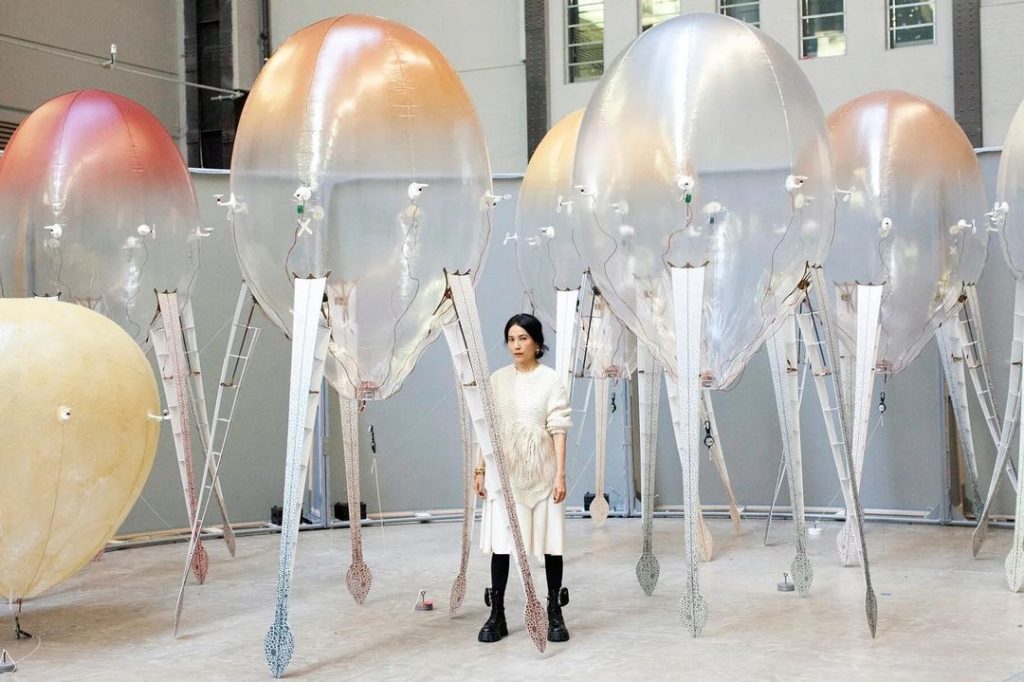There is something fascinating in the works of Anicka Yi. And, at the same time, ‘disturbing’. Something that refers to a ‘contemporary world’. After that; too real and also to dramatic. Full of questions. Full of uncertainties and unanswered issues. Something outrageously creative.
Yi’s practice explores the materials of biology and technology. He systematically (one could almost say “scientifically”) breaks down the epistemological barriers. He challenges our previous understanding of the world.
His approach shakes ancient certainties. To the point of questioning the human being. Makes us want to discover the Anicka Yi’s post-human ecology.
Post-human ecology
There is far too much talk today about the post-human. But no one does it like Anicka Yi. No one addresses social and environmental inequality so lucidly.
No one has the audacity to put us in front of the (destabilizing) necessity of having to live with an Other than Itself. A non-human Itself; of whom we know nothing. With whom, above all, we cannot say whether we will be able to cohabit and coexist.
New ecosystem
How would it feel to share the world with machines that live in the wild; and can evolve on their own?
Anicka Yi offers a vision of this new ecosystem. Strange zoomorphic devices float through the air. They prompt us to think about new ways THEY (the machines) might inhabit the planet. Or other planets. In the presence; maybe also in the absence of humans.

“Writing is one of my main tools”
Anicka Yi (born 1971 in Seoul, South Korea) is a conceptual artist. Living and working in New York City. She is known for installations that engage the senses. Particularly the sense of smell. She collaborates with biologists and chemists for this.
She states. “Writing is one of my main tools. I often discover my thoughts about work through writing. Syntax, sentence structure . . . these things really help. I write a lot of backstory for my sculptures, as if they were characters in a novel or screenplay.”
A natural history of machines
In the beginning Anicka Yi poses some questions. How to define the Anicka Yi’s post-human ecology? What might a “natural history of machines” look like? What kind of “synaesthetic” landscape would they create around them? Machines that evolve to become living creatures. Yi calls these machines “aerobes”. Their shapes are reminiscent of oceanic living or mushrooms. They combine aquatic and terrestrial life organisms these aerobes. Finally form new possibilities; new species. New hybrid machines.

The Flavor Genome
Individual, and group, behaviors of aerobes develop over time. In other words, they are influenced by ecosystem elements such as movement. Heat and fragrance trails released by other entities present.
Aerobes communicate with each other in ways we cannot understand. Yi wonders if, by merging technology and biology, these machines could evolve as independent life forms.
Scentscapes
Yi is known for her experimental work that explores the fusion of technology and biology. Breaking down distinctions between plants, animals, microorganisms and machines; she asks us to include ourselves in complex ecosystems. As you visit the exhibition you can smell different scents. Together they form a “scentscape”. Indeed, this ‘specific’ landscape (scentscape) is an integral part of the show.
Being a body in the world
But there is more. Through his aerobes, Yi asks us to rethink our conception of intelligence. In its rapid development, artificial intelligence (AI) is often tied exclusively to the brain. “Most AI functions as a mind without a body. However, living organisms learn so much about the world through the senses.”
The knowledge that emerges from being a body in the world, engaging with other creatures and environments, is called physical intelligence.
What if AI could learn through the senses? Machines could develop their own experiences of the world. They could become independent of humans. They could exchange information with plants, animals, and microorganisms.

Life reinvented in the machine
It’s a perturbing prospect. But it’s also a concrete option. A team of specialists has developed autonomous versions of unmanned aerial vehicles (UAVs) to bring Yi’s aerobes to life. UAVs don’t require humans to pilot them. Here, each one follows a unique flight path generated by a wide range of options in the system’s software.
An artificial life program
This software is an artificial life program. Scientists use such simulations to study natural life processes. For example, such as evolution and collective behavior. They are also used to create realistic effects in digital animations.
Aerobes respond to changes in the environment; including heat traces of people present.
They receive information from electronic sensors, which act as activators of their senses. This sensory information influences individual and group movements.
In other words, Anicka Yi’s post-human ecology explores the fusion of technology and biology. It breaks down the usual distinctions between plants, animals, microorganisms and machines. And it poses a fundamental question. How shifting these divisions can challenge the conception of humans as unique. As distinct from other life forms. That’s it in a nutshell, Anicka Yi’s post-human ecology; in love with the world.
You may also be interested in: Visual poetry created by “Aguaya en flor” – Thegreensideofpink
ANICKA YI: IN LOVE WITH THE WORLD





